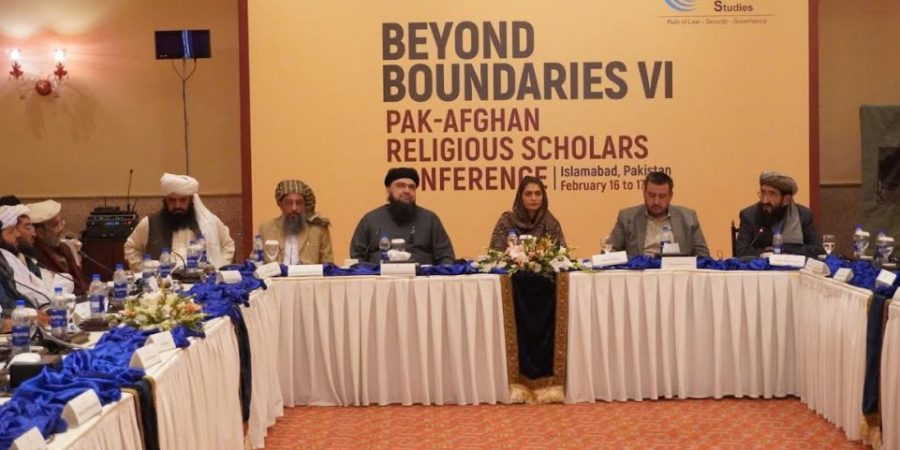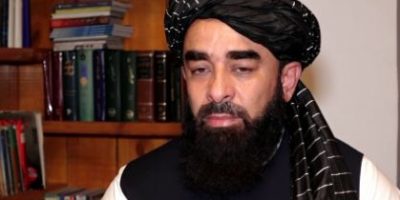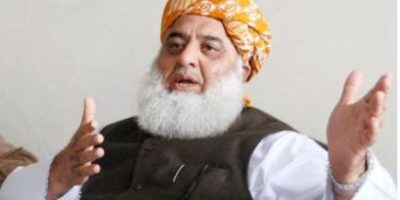Pak-Afghan religious scholars emphasize dialogue, trust-building for peace in the region

ISLAMABAD, FEB 20 (DNA) – The Pakistan-Afghanistan Religious Scholars Conference held in Islamabad witnessed a profound exchange of ideas and perspectives over the course of two days. The discussions reflected a deep-rooted commitment to fostering mutual understanding and addressing shared challenges. It revolved around various aspects of bilateral relations between Pakistan and Afghanistan, with a focus on promoting peace, stability, and socio-economic development in the region and, the potential of religious diplomacy.
There was consensus on the need for sustained efforts to address humanitarian crises, promote dialogue, and build trust between two sides.
The conference was organized by the Center for Research and Security Studies (CRSS), in collaboration with its Afghan partner Organization for Economic Studies and Peace (OESP), as part of their initiative Beyond Boundaries.
The chairman of the Council of Islamic Ideology (CII), Dr. Qibla Ayaz emphasized the importance of religious diplomacy and the role of scholars in addressing bilateral issues between Pakistan and Afghanistan. Based on his experiences of participation in various delegations and dialogues aimed at promoting girls’ education, both domestically and in Afghanistan, he emphasized the need to engage with key stakeholders, including religious leaders who possess the influence and understanding to contribute meaningfully to resolving bilateral issues. Dr. Ayaz stressed the importance of understanding Afghan perspectives, addressing their concerns transparently, and advocating for a people-centric approach to diplomacy. Additionally, he underscored the significance of addressing healthcare crises in Afghanistan and supporting the country’s efforts to achieve self-sufficiency in critical domains.
The Khyber Pakhtunkhwa Chief Khateeb, Maulana Muhammad Tayyab Qureshi noted that the way forward for the relationship between Pakistan and Afghanistan lies in both sides proactively addressing mutual concerns and taking conscious efforts to promote cordial ties between them at different levels of the relationship, including people-to-people, economy, political, etc.
He stressed the importance of addressing the insecurity and humanitarian crises plaguing the region, particularly the desire among the young members of the population to leave due to economic hardships.Additionally, he advocated for empowering women and promoting education, citing examples of Muslim-majority countries where progress has been achieved through a balance of religious and formal education.He also commended the progress made as part of the Beyond Boundaries in the past two years.
Abdul Hakim Mujahid, Former Afghan Diplomat shed light on Afghanistan’s dire humanitarian situation, calling for the lifting of sanctions to tackle the crisis and economic challenges effectively. He suggested integrating the Afghan Taliban into the global fabric to effectively combat terrorism and ensure stability.Mujahid emphasized that while Afghanistan may not be experiencing the same level of terror incidents as in the past, the population is grappling with pervasive poverty and instability.
Maulana Hamid-ul-Haq Haqqani, Vice Chancellor,Dar-ul-Uloom Haqqanihighlighted the intertwined fate and historical connections between Pakistan and Afghanistan. He advocated for inclusive policies that promote education and empower women, recognizing the crucial role of education in fostering socioeconomic stability and peace. He also underscored the importance of engaging with a diverse range of stakeholders, including Taliban leaders, to address the complex challenges facing the region.
Mufti Jamaluddin, Former MNA JUI-South Waziristan, emphasized that the cultural and religious similarities between Pakistan and Afghanistan can bind the two nations into a relationship characterized by cooperation, trust, and understanding. He shared his experiences of engaging with Afghan Taliban leadership alongside prominent religious and political figures, highlighting the warm reception they received and the shared desire for Afghanistan’s progress and development. He stressed the that the cross-border interactions should not be hindered by bureaucratic hurdles and underlined the importance of improved people-to-people ties and mobility across the border.
Khaliq Dad Haqqani, Afghan religious scholar, underscored the need for sustained efforts to address longstanding challenges and promote stability in Afghanistan. He highlighted the positive developments observed during Taliban rule, including the restoration of peace and the neutralization of militantgroups. He stressed the pivotal role of education in empowering Afghan youth and fostering national progress, advocating for standardized and inclusive educational systems in Afghanistan for its integration into the global community.
Molana Khanzeb, religious scholar and politician from Bajaur, Pakistan, underscored the importance of inclusive and well-thought-out policies both internally within Pakistan and Afghanistan and externally with regard to regional dynamics. Khanzeb advocated education for all, especially girls, a transparent and diplomatic approach to addressing sensitive issues between two countries, emphasizing the need for urgent dialogue and resolution.
Razia Aziz, Former Pakistani MNA particularly focused on the economic and educational aspects of the Afghanistan-Pakistan relationship, highlighted the detrimental effects of trade disruptions and emphasized the importance of keeping trade routes open to strengthen bilateral ties and promote economic stability in both countries.
Dr. Abdul Rehman, Chairman of Department of Law and Sharia, Shaikh Zayed Islamic Centre, University of Peshawar focused on the role of media in shaping public perceptions and promoting constructive dialogue between Afghanistan and Pakistan. He emphasized the powerful influence of media narratives in either exacerbating tensions or fostering mutual understanding and cooperation between the two countries.
Abid Shakiri, a Pakistani Shia scholar, highlighted the significance of education, particularly women’s education, as a fundamental right and a key driver of socioeconomic progress. He underscored the role of religious scholars and institutions in promoting tolerance, compassion, and social justice, calling for their active involvement in advocating for human rights and equality.
Qasim Haqqani, a religious scholar from Chaman, proposed practical recommendations, including the establishment of a border committee comprising eminent religious scholars from both sides, to address border-related concerns collaboratively. Qasim’s contributions underscored the need for inclusive dialogue, informed policymaking, and cross-border cooperation to tackle shared challenges and promote mutual understanding between Afghanistan and Pakistan.
Wahid Wahid, a writer and analyst from Afghanistan emphasized the urgency and importance of education for Afghan girls and women, highlighting that the denial of education to half the population goes against Islamic principles.
Dr. Sajida from International Islamic University, Pakistan emphasized the integration of religious and worldly education as essential for individual and societal development. She emphasized the importance of replicating successful models of education to promote women’s education and empowerment.
The participating female Afghan religious scholars cited Islam’s support for education for both genders and highlighted the importance of integrating religious and contemporary education to empower women and promote socioeconomic stability.
Overall, the conference provided a platform for constructive dialogue and collaboration among religious scholars and stakeholders from Pakistan and Afghanistan, laying the groundwork for continued efforts towards mutual understanding and cooperation.
Related News

Islamic Emirate dismisses SCO’s call for inclusive govt as internal matter
KABUL, JUL 5: The Islamic Emirate called the Shanghai Cooperation Organization’s request regarding the establishmentRead More

Fazl-ur-Rehman to Pakistan Authorities: You Cover Up Your Failures
KABUL, JUL 3: Maulana Fazl-ur-Rehman, the leader of Pakistan’s Jamiat Ulema-e-Islam party, said that theRead More


Comments are Closed